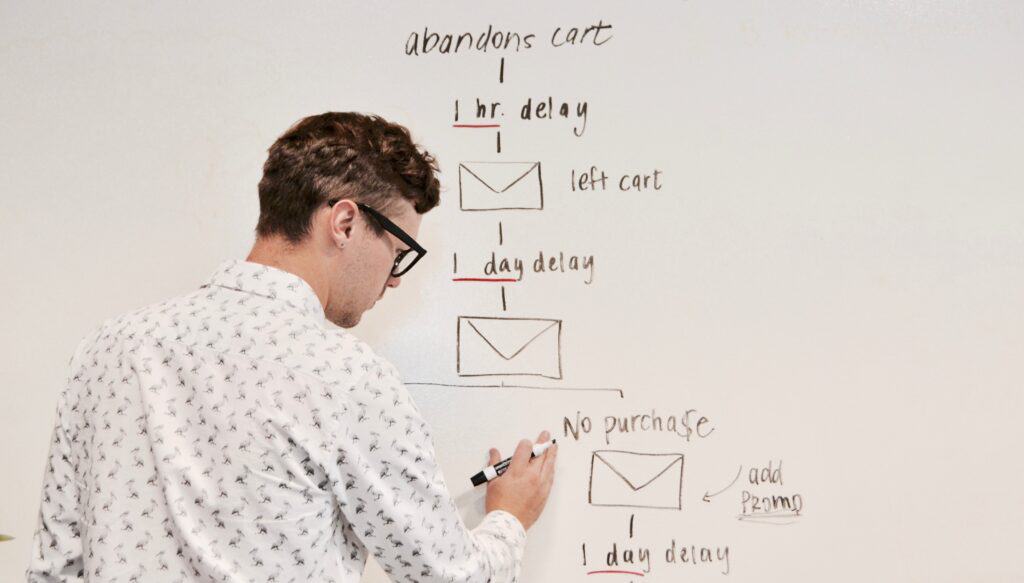Hotel marketing is an art worth mastering. If effectively done, marketing makes your target audience aware of your hotel and positions it as the one to book from the many available options. That makes it key to keeping the bookings – and the revenue – flowing.
However, letting the world know about your brand is no mean feat in an industry that’s flooded with competition and evolving by the day. So just how do you optimize your hotel’s marketing for results?
In this article we’ll introduce an 8-step marketing plan to get you organized and 14 proven strategies for you to consider and combine.
What is hotel marketing?
At its core, marketing refers to the activities you carry out to spread the word about your hotel and reach new customers.
Your overall objectives with your marketing are to build awareness of your brand and to make your hotel appeal to your target audience. By doing so effectively, you both attract new guests and keep current guests coming back.
However, getting your marketing right is complex. It requires the precise combination of planning, strategy and creativity to achieve proper results. You must make smart choices regarding your marketing budget, channels, and messages and find innovative ways to stand out from the competition.
Most of the marketing strategies we’ll discuss in this article refer to digital marketing. In today’s digital age, travelers are searching for their trips on the web, so you must amplify your presence on digital channels like your website, email and social media. Many digital marketing tactics are cost-effective, measurable, and help you reach your audience on the online platforms where they spend their time.
Why is hotel marketing important?
Everywhere you look, you’re facing competition to win over potential guests: other independent hotels, big chains, and other accommodation types (e.g. vacation rentals), to name a few. Effective hotel marketing is like casting the magic spell you need to 1) get noticed and 2) stand out from these competitors – in the best way possible.
The key benefits of effective marketing are:
- More bookings
- More revenue
- Higher guest loyalty from keeping your guests informed and nurtured
You probably agree that these outcomes make putting time and effort into your marketing more than worthwhile! So let’s dive into the main components of hotel marketing and the strategies available to you.
Building a marketing plan
The first step to successful marketing is planning. Creating an effective marketing plan involves a strategic blend of conducting research, defining your audience, setting goals, budgeting, and selecting your channels. Let’s go through the process step by step.
Step 1: Conduct Market & Competitor Research
Begin your planning by conducting some thorough market research. It’s important to analyze current industry trends, consumer preferences, and emerging opportunities in the market. At the same time, you want to analyze your main competition. Study your competitors’ marketing strategies, identifying their strengths and weaknesses.
Doing this analysis will unveil gaps in the market and guide your hotel’s unique positioning. What are you able to offer that competitors don’t? What emerging travel trend is your hotel best placed to leverage? These are the sorts of questions that good research helps you to answer before you solidify your marketing plan.
Step 2: Identify Your Target Audience
Defining your audience allows you to focus your marketing efforts, rather than trying to position your hotel as the perfect solution for everybody – an impossible task! Define your ideal customer personas based on a combination of the following factors:
- Demographic (e.g. age, gender, income bracket)
- Psychographic (e.g. personality traits, habits, interests, booking behaviors)
To gather this information, turn to the data sources at your disposal, including online reviews, social media posts, guest surveys, and analytics tools. A comprehensive custom report writing tool like the one in eviivo Suite™ allows you to generate reports from scratch, leveraging the existing guest data held in your property management system (PMS). For example, you could design a report that extracts key data on your guests’ country of origin and/or preferred booking sources (e.g., major OTA channels, direct bookings).
By using this data to flesh out your target demographics and psychographics, you’re able to understand your ideal customers’ needs, preferences, and pain points – allowing you to tailor your key marketing messages and channels. Remember, for each persona you want to target your goal is to learn:
- Who the customer is
- What they want
- How you can offer them what they want
For example, let’s say you want to position yourself as a family-friendly hotel. Through your research, you build the customer persona of a 34-year-old married woman with two small children who lives in a suburban area. She enjoys outdoor activities, values quality time with her family, and wants accommodation that offers spacious rooms and child-friendly amenities. She also relies on online reviews when choosing stays. Having all this information at your disposal allows you to start identifying ways to attract this ideal customer to your hotel.

Step 3: Set Your Marketing Goals
Now you have an idea of who you’re targeting and how you want to position your hotel to them, establish some clear goals for your marketing initiatives. Whether it relates to increasing bookings, enhancing brand awareness, or driving more repeat business, each goal should be SMART:
- Specific
- Measurable
- Achievable
- Relevant
- Time-bound
That sounds like a lot of boxes to tick, but each SMART goal should be simple enough to fit into one short sentence. Here are a few examples to spark ideas:
- “Increase direct bookings by 20% in the next quarter”
- “Grow social media engagement by 15% in six months”
- “Increase conversions for special offers / packages by 25% in the next two quarters”
- “Launch a personalized email campaign that yields a 25% increase in repeat bookings within three quarters”
- “Increase the volume of TripAdvisor ratings within one year”
Step 4: Allocate Your Marketing Budget
Your marketing budget lays out the money you intend to spend on your marketing activity. Set your budget on an annual, quarterly, or monthly basis – it’s up to you.
However, your precise budget should be based on your goals and your available resources. So, allocate spend for various activities such as digital advertising, social media campaigns, content creation, and events. Aim to balance your spend allocation to ensure comprehensive coverage across channels.
Remember also that your budget may dictate your activities. If you have a considerable budget, you have more space to take advantage of paid digital advertising and/or sponsored content opportunities. If not, consider prioritizing marketing strategies that won’t break the bank, involving the likes of organic social media and email marketing.
Step 5: Select Your Channels
Now it’s time to choose the most appropriate channels for your hotel marketing activities. Marketing channels are the strategic avenues you use to reach and engage your target audience. Digital channels like social media, search engines, and email campaigns are crucial in today’s landscape, and we’ll discuss each in more detail later in this article. Although we’re focusing mostly on digital marketing, you may also consider incorporating traditional (non-online) channels like print media and events.
As mentioned above, your budget allocation may dictate or guide your choice of channels. The list of free marketing channels includes:
- Social media apps
- Organic SEO
- Content marketing
- Certain Q&A or review platforms
- Video marketing (e.g. YouTube)
The paid marketing channels at your disposal include:
- Paid ads
- Paid search (Google Ads)
- Influencer marketing
Paid marketing allows you to target a very specific audience and get your brand in front of them fast. Generally, you’ll bring in leads from paid channels more quickly. However, free channels allow you to build your brand over time with content that has more wide-ranging, long-term outcomes than paid campaigns – from informing and entertaining your audience to creating trust in your brand. Of course, it’s not an either/or – many effective marketing strategies combine free and paid channels to optimize their success.
Step 6: Create Your Content Strategy
Use your research findings and customer personas to help you craft engaging, relevant, and valuable content that speaks directly to your target audience’s desires and pain points. Aim to share captivating stories, high-quality visuals, and user-generated content that fosters engagement and brand loyalty. You’ll get more detail on how to ace your content marketing later in this article.
Step 7: Keep Track of Your Marketing Performance
To stay on the right track, it’s vital to regularly monitor and analyze the performance of your marketing initiatives and campaigns. Utilize tools like Google Analytics, social media insights, and any performance reporting tools in your Property Management System (PMS) that collate booking data. Based on what you find, you’ll be able to adjust your strategies for continued success.
Step 8: Adapt & Innovate
We all know that the hospitality industry evolves rapidly! So be sure to stay agile and open to adapting your marketing plan based on changing market dynamics and emerging trends. Remember that being an innovator in the services you offer, the technology you employ, and the guest experiences you create will make your hotel stand out.
By following these steps, your marketing plan will serve as a roadmap to success, enabling you to:
- Build a brand presence that sets your hotel apart
- Get your target audience engaged and excited
- Achieve your hotel’s business objectives
There are a huge range of marketing strategies, tactics and channels out there for you to use. Let your planning guide you to the methods that make sense for your hotel business. To spark some inspiration, let’s now look at 14 popular, high-reward marketing strategies.
1. Leverage the power of Search Engine Optimization (SEO)
SEO is the art of optimizing your web content to rank highly in search engines, so that you drive more visitors to your website – the online shopfront for your business.
SEO practices, like integrating keywords that your audience is searching for into your content, help you drive traffic to your site. This is the first step in increasing your online visibility, building brand awareness, and raking in the commission-free direct bookings that delight all hoteliers.
SEO is a complex practice that requires ongoing time, money and effort to be effective. If you’re new to the topic and want to get to grips with the basics, read our SEO beginner’s guide.
2. Optimize your website design
SEO may get searchers to your website, but it’s the website’s job to convince them to book. Therefore, it’s important that you have a user-friendly web design, complete with a seamless journey that guides searchers all the way through to booking completion. The list of ways to optimize your website design is wide-ranging, but here are a few questions you should be asking to get started:
- Is my website’s design responsive?; i.e., Does it look good on all devices?
- Is a ‘Book Now’ button prominent and on every page?
- Am I promoting my hotel’s USPs (unique selling points) above the fold on each page?
- Does my website showcase great, hi-res photos of the hotel?
Once you’ve nailed the fundamentals of your web design, take a proactive approach to updating your website. Regularly optimize it with new promos, info, events, content and more. Remember that searchers want to see a website that’s current and active – without being cluttered!
For help optimizing your website’s design, use a website manager software that makes it easy to customize pre-existing templates and to upload content (like images and videos), all without the need for expensive web developers.
3. Get strategic with your content marketing
Adding engaging content to your online channels is a great way to drive traffic, build your brand, and market your hotel to potential guests. Content includes everything from blog posts on your website to videos you post on your social media.
Whatever form your content takes, it should provide value to your target audience. Think about what your ideal customers are looking for, and use content to show them how you provide it. For example:
- Create content that shows off the amenities and services you offer
- Showcase the best attractions, events and places to eat in the local area
- Present the interesting history of your hotel
- Take guests behind the scenes for ‘day in the life of’-style posts
- Create an FAQ page to address the most common questions asked by guests
The content strategy you create as part of your marketing plan should lay out what you’re going to produce over a given period to align your content with your SMART goals. Use your customer personas to identify relevant, valuable content topics, and keep your content strategy sustainable by factoring in the resources and skills at your disposal. For example, you may have time to create daily Instagram posts in-house, but producing a weekly podcast on top of your day-to-day tasks may be too much!
4. Leverage the marketing power of third-party channels
Direct bookings may make you happiest, but third-party channels amplify your online visibility like nothing else. Popular OTAs (online travel agencies) like Booking.com, Hotels.com and Expedia have massive marketing budgets at their disposal. By listing on these giants, you gain the opportunity to showcase your property to millions of online searchers.
List your hotel on multiple channels for the best results, but don’t go overboard. Select the big players plus one or two OTAs in your specialized niche or area. Knowing your target audience helps you make the best choices here. To start identifying which channels your ideal customers are searching on, take a look at our OTA infographic.
You should also make the most of metasearch engines like Trivago and Google Hotel Ads. These channels aggregate the listings of other OTAs, making it easy for searchers to compare rates and deals. However, because potential guests using metasearch are going to be cycling through various third-party sites, you may want to have an effective remarketing strategy in place to capture direct bookings. (We’ll come back to remarketing as a strategy later in this article).
Whatever third-party channels you select to market your hotel business, make sure you stay in control of your OTA listings and avoid double bookings by choosing the right hotel channel manager.
5. Excel with email marketing
Marketing via email is a powerful yet cost-effective way to communicate with guests at every point of the traveler lifecycle. For this reason, 79% of marketers list email among their 3 most effective marketing channels.*
In fact, the list of ways you can use emails in your marketing is endless. Just a few examples include:
- Promoting your existing content
- Sending out special offers and incentives like limited-time lower rates, seasonal specials, or free upgrades
- Upselling extras to drive more direct revenue pre-stay
The first step to effective email marketing is building your database. Collect email addresses from past and upcoming guests, and find other ways to capture email recipients, like adding an email signup widget to your website, or setting up a regular e-newsletter. Whatever your methods, make sure your email list is compliant with relevant data protection regulations (e.g. GDPR) and that all recipients have given their express consent to be contacted by you for marketing purposes.
A strong PMS allows you to generate a list of previous guests who have agreed to receive marketing emails, which are then ready to use with free mass-mailing tools such as SendinBlue or Mailchimp
Learn the top 5 email marketing must-haves for the hospitality sector.
6. Stand out on social media
The biggest social media platforms boast billions of users combined, many of whom lap up travel-related content daily. So why not make the most of the undeniable demand for this content by showcasing your hotel on social?
Use your chosen social channels to post photos, videos, captions, stories and reels that encourage eager travelers to check in. Visual content is especially important to showcasing your stunning stay. For this reason, acing your Instagram marketing is a particularly good idea! And remember that your social channels are a great way to promote the content on your other owned channels, like your website.
You may also want to leverage user-generated content to turn existing guests into your very own marketing team. Social media posts from guests praising their stay may promote your hotel to a whole new set of potential visitors, so encourage guests to post about what a great time they had.

7. Put the power of AI at your service
Customer expectations are evolving. Potential and upcoming guests want to be able to interact with the hotels they’re interested in, whenever they want. Artificial intelligence (AI) allows ‘you’ to support these guests 24/7. AI software can be programmed to respond to visitors’ enquiries and provide them with the information they need to proceed with the booking process.
Opt for an AI-powered guest management tool that allows you to
1) program it with data/content that you select
2) monitor guest-AI conversations
This keeps you in control and ensures your AI tool stays in line with your values and brand while providing accurate, relevant responses.
Learn more about bringing your hotel guest communication into the 21st century.
8. Establish a loyalty program
You may see marketing primarily as a way to entice new business, but there’s a lot of value in engaging past and current guests. Establishing an effective loyalty program is a great way to earn more revenue by encouraging past guests to return again and again.
Loyalty programs work by offering unique perks and discounts to returning guests. To run a simple customer loyalty program, flag guests that have stayed with you several times to receive a unique promo code, which you can give or send to them when they check out. This can be set up easily with the right promo management software. Your post-departure email also gives you an opportunity to incentivise guests to stay with you again.
If you have time and resources to run a more sophisticated loyalty program, consider a points-based system that allows guests to unlock different levels of perks by earning points.
9. Partner with influencers
‘Influencers’ are people who have a significant online following among your target audience. For example, there are many travel influencers with audiences who follow their various trips and stays on social media.
By partnering with an influencer, you’re able to use their clout to promote your property and potentially earn new followers – and guests – from their pre-established audience. Your partnership could involve working with the influencer to create videos, social media posts, blogs, or other marketing assets that involve them posting about what makes your hotel special.
10. Don’t forget about PR
PR (public relations) deserves an inclusion on this list even though its goals differ slightly from those of marketing. PR incorporates the strategies used to build your brand’s credibility over the long-term, whereas marketing is fundamentally about driving revenue by reaching guests. However, both practices involve sending messages to the right people to influence their actions and attitudes, and the two often work together to achieve mutual benefits.
Essentially, if your business effectively deploys PR activities, then it gives your hotel marketing efforts a leg up. This is because, as a marketer, it’s easier to have a credible and positively perceived brand to leverage for success.
A major focus of PR activity is achieving positive attention in the media. As a hotelier, getting positive press is a fantastic way to get your accommodation noticed. However, we know that earning that press often requires time and effort that may not be possible on top of your other marketing practices. eviivo Collective opens the door for property owners, hosts and boutique hoteliers to be recognized, giving eviivo customers the opportunity to receive free press in major media outlets.
11. Use remarketing to convert visitors
Research from Zippia shows that the abandonment rate for travel purchases sits at a massive 85%. This means that the overwhelming majority of travelers who begin the online booking process don’t complete it.
Remarketing is your opportunity to turn these almost-bookings into actual ones! It works by targeting users who have recently interacted with your brand (e.g. by visiting your website), and presenting them with paid ads that remind them of their interaction. This nudges them towards completing a desired action – like that booking they started but didn’t finish.
Your remarketing ads can take many forms, including:
- Display ads on third-party websites
- Search ads on search engine results pages
- Video content on platforms like YouTube
Remarketing helps you close more bookings by targeting people who have already shown an interest in your hotel. If your marketing budget allows, you may want to show these targets a deal for that extra bit of encouragement to book with you.

12. Stay on top of your reviews
Like other forms of user-generated content, reviews effectively turn your guests into marketers for you. Having a store of sparkling 5-star reviews allows you to build your hotel’s online reputation. It also serves as the social proof that many travelers need to make a booking.
To drive as many great reviews as possible, send post-departure emails to guests requesting their feedback. Use the right guest management software to automate the email send, so that your request is sent out to every guest without you having to lift a finger. You may also benefit from highlighting particularly positive reviews on other channels, like your social media or emails.
Responding to reviews is just as important as encouraging them in the first place. Respond to as many reviews as you can within 72 hours of them being posted, as this shows that you care about feedback. To make staying on top of responses simpler, look for a unified guest messaging inbox that allows you to read, manage, and reply to your guest reviews from one place. Your software should also allow you to choose which reviews you post on your website, so the most glowing guest experiences are front and center.
13. Match marketing spend to peak demand
One key aspect of using your marketing budget wisely is to set aside more of your ad budget for your busiest season. After all, your peak season is ready-made for your marketing efforts to go further. Take advantage by running campaigns in the run up to that peak that position your hotel as the perfect option for your audience.
Obviously, identifying your periods of peak demand is essential here. If you run a beachside hotel or a ski-slope getaway, you probably have a good sense of your peak season. If not, use the performance insights at your disposal to identify the times of year when most bookings are made at your hotel.
You may want to go even more granular with your scheduling and set up your higher-budget ads to run at the peak booking times for the audience you’re targeting. For example, if your target is business travelers, your audience is more likely to be booking during work hours. In that case, setting up ads to run during the 9-5 may prove most effective.
14. Get rolling with video marketing
Research from Wyzowl has found that 96% of businesses see video as an important part of their marketing strategy. And with good reason! People spend hours per day watching video online.
Take advantage of the demand for video by setting up the relevant social media channels for your hotel, then develop content that your audience wants to see. The biggest video marketing channels include YouTube and social media channels like Instagram and TikTok, where video content has exploded in popularity in recent years. Your options are plentiful and include:
- Posting live streams to show the behind-the-scenes at your hotel
- Interviewing customers on camera to create promotional videos
- Running video ads to capture your audience’s attention
If you have enough budget, consider using a videographer to capture beautiful, high-quality footage for your video marketing. If you’re creating videos yourself, follow industry best practices to keep all the elements professional, from sound quality to lighting.
Conclusion
Mastering your hotel marketing takes time and effort, but it’s worth the rewards. With an 8-step plan to guide your efforts and 14 proven strategies in your toolkit, you’re well-prepared to begin attracting guests, boosting revenue, and fostering loyalty.
Remember, research is your biggest ally, so delve into market trends and analyze your competition. Define your target audience, set SMART goals, and allocate your budget wisely. Choose the right channels, craft engaging content, and keep a watchful eye on your performance.
With these insights, you’re poised to stand out in the bustling hotel landscape, making every click a step closer to a delightful check-in. Happy marketing!
*Litmus, 2021 State of Email Report
Hotel Marketing: 8-Step Plan + 14 Proven Strategies for Success
Key Takeaways
- Strategically plan your hotel marketing: Conduct thorough market and competitor research, define your target audience, set SMART goals, and allocate your marketing budget accordingly.
- Leverage digital channels: Prioritize digital marketing, including SEO, social media, and email campaigns. Consider both free and paid marketing channels to optimize success.
- Content is king: Create engaging, relevant, and valuable content that resonates with your audience. Use customer personas to identify content topics that align with your SMART goals.
- Harness third-party channels: List your hotel on popular OTAs for increased visibility, plus metasearch engines like Trivago and Google Hotel Ads. Use a Channel Manager to keep in control of your listings.
- Embrace new trends: Explore AI for 24/7 guest support. Consider loyalty programs, influencer partnerships, PR activities, and remarketing to boost bookings.


